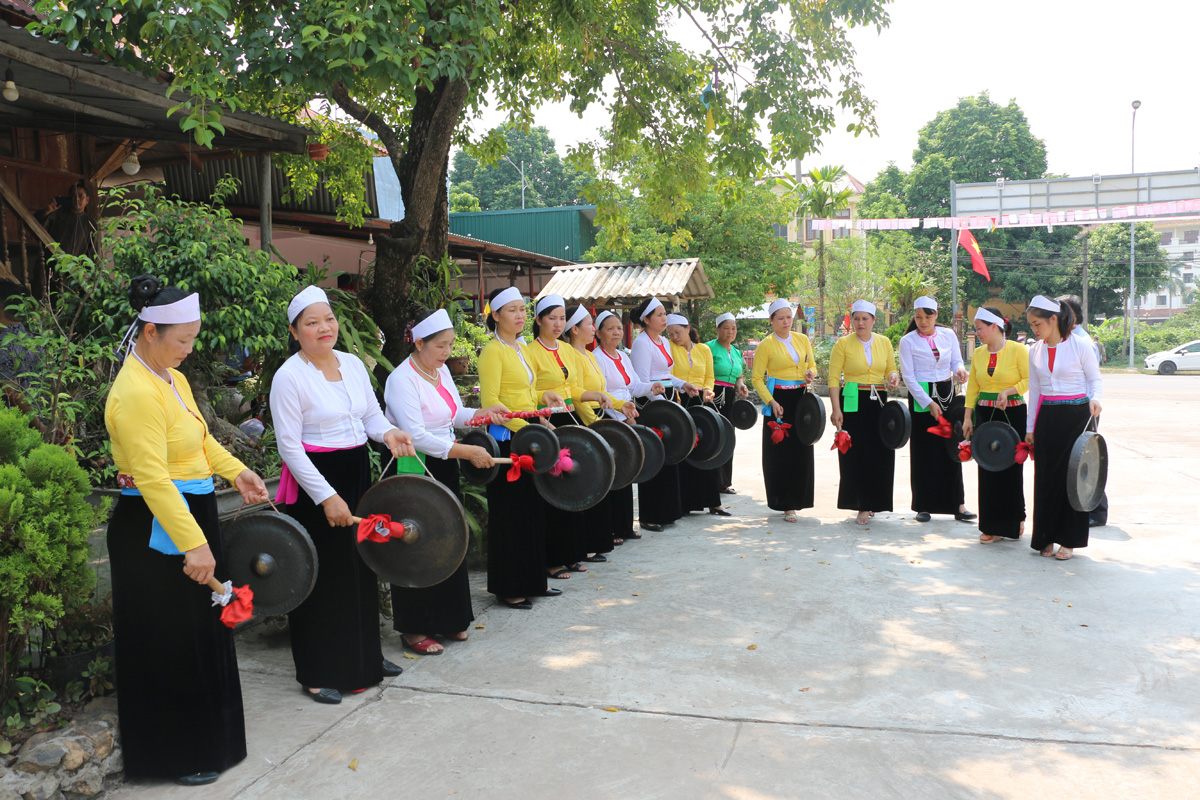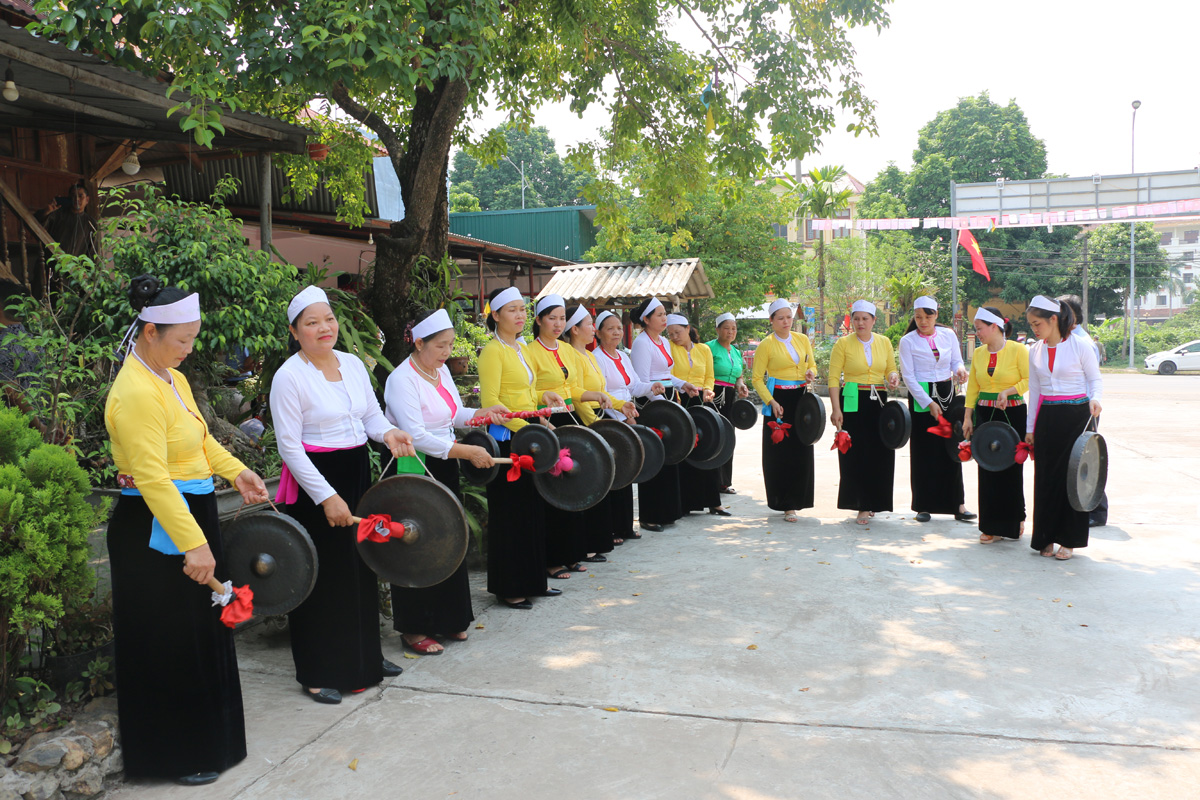
(HBO) - There are 6 main ethnic groups living together in the province. Muong ethnic group is the largest, accounting for 63%; Kinh people account for 27.7%; Thai, Dao, Tay, Mong and other ethnic groups account for 9.3%. The ethnic groups have not only the common cultural characteristics and beliefs, but also the unique and diverse traditional culture and beliefs of each ethnic group. The majority of ethnic groups still retain the basic features in their national customs and beliefs. The heritage values of literature and art, language and hand writing are preserved; the folk knowledge and costumes are kept at an average level.
 The women in Thinh Lang ward (Hoa Binh city) often use
gongs in important local festivals or events.
The women in Thinh Lang ward (Hoa Binh city) often use
gongs in important local festivals or events.
Over the past years, the appropriate uthorities have developed programs and action plans on the culture and conservation, promoting the values of the intangible cultural heritage. Specifically, up to now, they have invested in the restoration, embellishment, preservation and
construction of a traditional cultural village, dozens of cultural and
community villages at the provincial level; nearly 30
scientific topics on the culture and the ethnicity have been carried out; nearly 50
classes of folk art transmission, hundreds of ethnic minority literacy classes have been invested to be carried out; 59 festivals have been restored and maintained.
Based on the inventory results of the intangible cultural heritage of the ethnic groups in the province, from 2013 the Provincial Party Committee
and People's Committee have had a policy to allow to collect, research and set
up scientific record for 2 intangible cultural heritages, that is Mo Muong Hoa Binh and Muong Gong Hoa Binh, and they have asked the Ministry of Culture, Sports and Tourism to decide to recognize them in the list of the national intangible cultural heritage in 2016. The have set up the record for the intangible cultural heritage of Mo Muong Hoa Binh to submit to UNESCO as a typical intangible cultural
heritage in need of urgent protection.
Determining the the intangible cultural heritage of the Hoa Binh ethnic groups as the invaluable property left by the ancestors to the younger generation today and tomorrow, is the soul of the
national culture. The work of preserving and promoting the cultural heritages is of great importance in educating the young
generation about the national cultural and historical traditions. Besides, it
is also a means to introduce and promote the images, the land and the people for domestic and foreign tourists, creating conditions for the
implementation of Hoa Binh tourism development strategy, contributing to the growth of the province’s social economy. Recently, there have been positive signals about the conservation among the people such as the development of the traditional
festival system, the development of Muong gongs, the value of Mo Muong and the
role of the shaman are respected and honored by the people. There have been many classes of
teaching the hand writing of Dao, Tay, Thai,
and Mong ethnic people and how to perform Muong gongs and dancing..., expressing that the people's consciousness have had positive changes. People are proud of theỉ own intangible cultural values, so they have a sense of conservation and
promotion.
With an increasingly vibrant and widespread emulation movement aimed at building cultured residential areas and cultured families, Yen Thuy District has been making steady progress toward improving both the material and spiritual well-being of its people, while fostering a civilized, prosperous, beautiful, and progressive community.
Once lacking recreational spaces and community facilities, Residential Group 2 in Quynh Lam Ward (Hoa Binh City) has recently received attention for the construction of a new, spacious, and fully equipped cultural house. The project followed the model of state support combined with public contributions in both labor and funding.
The "All people unite to build cultural life" movement, which has been effectively integrated with Kim Boi district’s socio-economic development goals, is fostering a lively spirit of emulation across local residential areas, hamlets, villages, public agencies, and enterprises. In addition, through the initiative, traditional cultural values are being preserved and promoted, while community solidarity and mutual support in poverty reduction and economic development are being strengthened.
A working delegation of the Hoa Binh provincial People’s Committee led by its Permanent Vice Chairman Nguyen Van Toan on June 11 inspected the progress of a project to build the Mo Muong Cultural Heritage Conservation Space linked to tourism services in Hop Phong commune, Cao Phong district.
Born and growing in the heroic land of Muong Dong, Dinh Thi Kieu Dung, a resident in Bo town of Kim Boi district, in her childhood was nurtured by the sweet lullabies of her grandmother and mother. These melodies deeply imprinted on her soul, becoming an inseparable part of her love for her ethnic group's culture. For over 20 years, this love for her hometown has driven Dung to research, collect, and pass down the cultural values of the Muong people to future generations.
In the final days of May, the Ethnic Art Troupe of Hoa Binh Province organized performances to serve the people in remote, mountainous, and particularly disadvantaged areas within the province. These were not just ordinary artistic shows, but they were the meaningful journeys aimed at spreading cultural values, enhancing the spiritual life of the people and contributing to the preservation of ethnic minority cultural identities.



 The women in Thinh Lang ward (Hoa Binh city) often use
gongs in important local festivals or events.
The women in Thinh Lang ward (Hoa Binh city) often use
gongs in important local festivals or events.